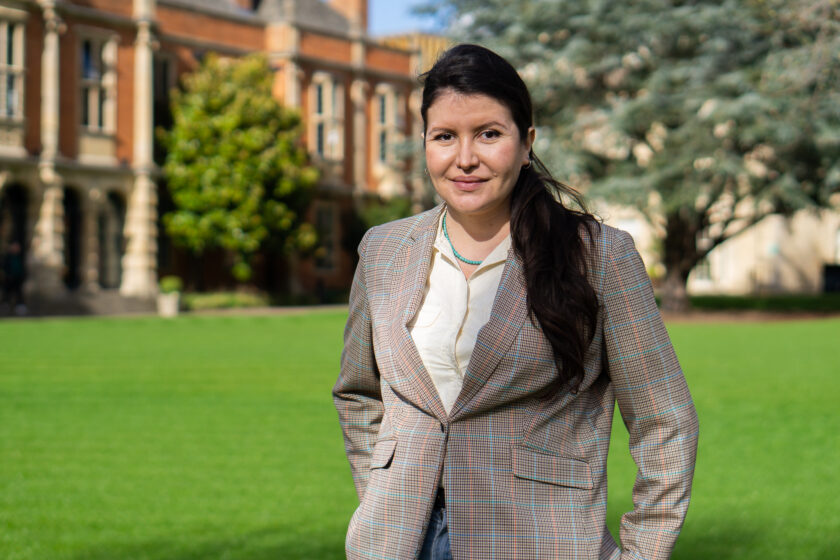Adriana Mordente is Somerville College’s newly appointed Sustainability Officer, tasked with leading the college towards a more sustainable future through community engagement, a comprehensive audit of our carbon footprint and the development of a three-year sustainability plan. She is studying for a doctorate within the Aquatic Biology Laboratory of Somerville’s Tutorial Fellow in Ecology, Professor Michelle Jackson, and joins us on Earth Day 2022 to talk about Somerville College’s sustainability plans.

Adriana Mordente, Sustainability Officer
1. How did you come to be working in sustainability?
My research is centred on understanding the carbon cycle and greenhouse gas emissions in freshwater ecosystems, and before coming to Somerville for my DPhil I worked in climate change and sustainable development for two UN organisations. All of this led me to become fascinated by the scientific aspects of sustainability and the process of elaborating joint strategies and working towards sustainability goals with everyone on board.
2. Somerville has never had a Sustainability Officer before. What do you think are the opportunities for you over the next year, and how are you looking to change or accelerate Somerville’s efforts?
This is an opportunity to both celebrate our accomplishments so far, and to dream about what we want to achieve together. We have recently identified several multiple co-benefits to accelerate our transition, so my role is to determine our starting point; consistently raise our ambition; and facilitate an environment where these changes are gradually implemented into our everyday life.
3. How far do you think Somerville has come, and what are the steps left to take before we can reach net zero? What do you see as being the biggest challenge, and what is the biggest opportunity?
Somerville has been doing so much behind the scenes, thanks to its Sustainability Working Group. Divesting from fossil fuels was a big step, but there’s so much more, including the recent works to insulate Vaughan. There is a genuine concern for operating in a more sustainable way within College, and that is taken into consideration in every decision made. We have a vibrant and ambitious community of students and staff ready to be part of the change.
Some of our biggest challenges before we can reach net zero involve finding better ways to heat and power our infrastructures and adapting to the new ways we work, study, eat, and enjoy leisure time after the pandemic. We have now the opportunity to tackle these challenges simultaneously in a way that reflects who we’ve become as a community.
We are also fortunate that we’re working in partnership with so many other colleges and faculties across the university as part of Oxford Net Zero. Collaboration on this level ensures that we’re not engaged in a race to achieve sustainability goals, but are rather sharing the knowledge of how to create change in a managed, collaborative fashion.
4. In addition to you and our GB climate change champion, Professor Jackson, Somerville has a Sustainability Working Group which contains members from across the college constituencies as well as Somerville’s Principal, Jan Royall and Treasurer, Andrew Parker. How does a working group like the SWG change the game when it comes to transitioning an institution towards being net-zero?
Having a Sustainability Working Group (SWG) means that every operating leg in Somerville is working towards sustainability from a shared vision and set of values. This has aligned our goals and broadened our scope of action. By being able to make decisions together, we are able to sustain them long-term and have a platform to create shared strategies for our future.
5. Somerville has a net-zero target, but we also have targets to improve our sustainability and bio-diversity. What does that distinction mean in practice, and what changes can we expect to see around college?
We are working closely with our Head Gardener and Research Staff to ensure the Somerville Estate is a haven for pollinators and birds, and that our gardens continuously host an appropriate mix of seedlings and plants to enhance and restore local biodiversity. Somerville is an early adopter of sustainable land management practices, which include restoration, prevention of soil erosion, mulching, minimal tillage, composting, and minimal use of fertilizers and organic pesticides. We are looking forward to sharing our good practices with local schools and even looking at the possibility of embracing a new ecosystem (a pond) that will act as both a biodiversity hotspot and an excellent teaching & learning resource.